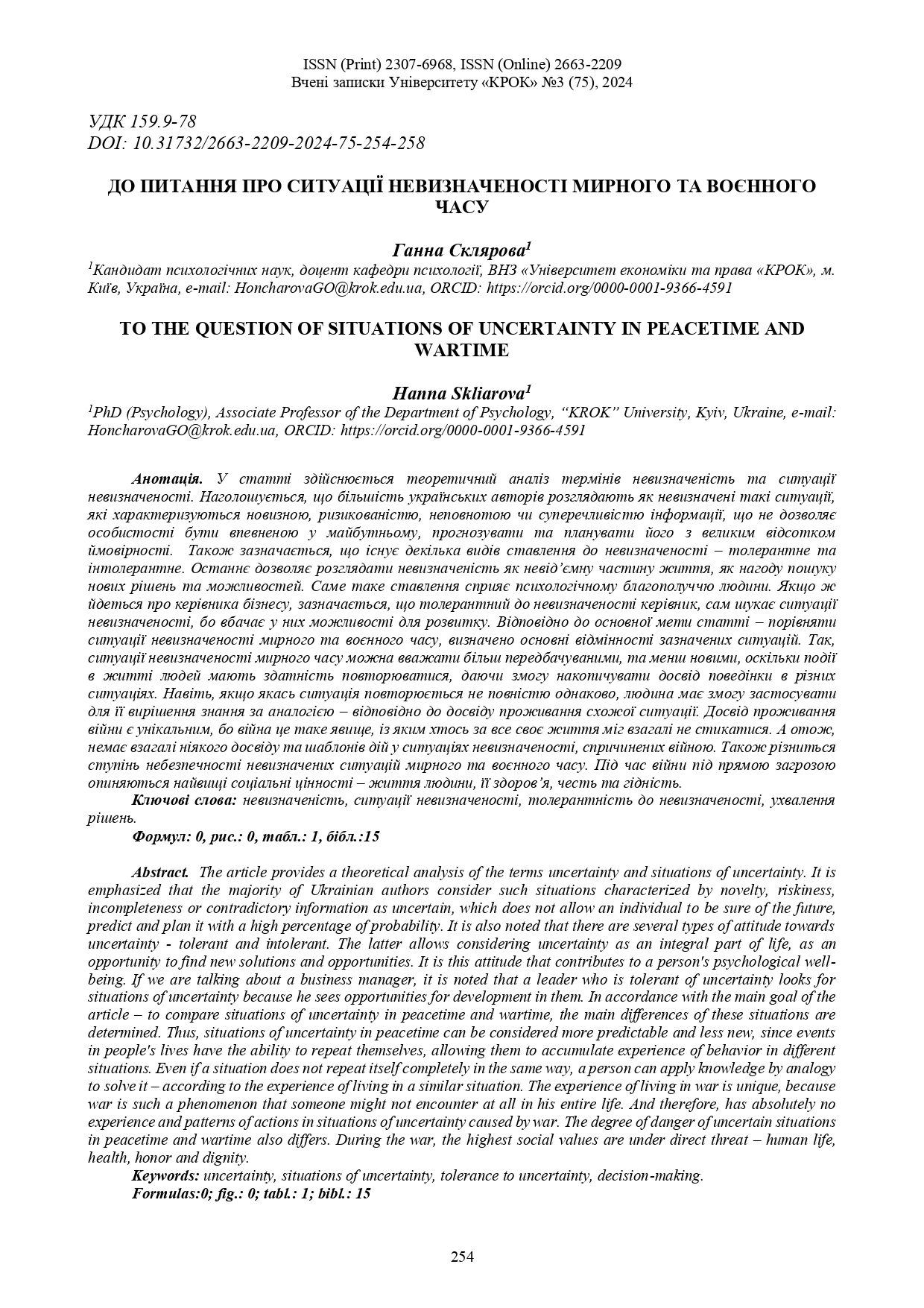TO THE QUESTION OF SITUATIONS OF UNCERTAINTY IN PEACETIME AND WARTIME
DOI:
https://doi.org/10.31732/2663-2209-2024-75-254-258Keywords:
uncertainty, situations of uncertainty, tolerance to uncertainty, decision-makingAbstract
The article provides a theoretical analysis of the terms uncertainty and situations of uncertainty. It is emphasized that the majority of Ukrainian authors consider such situations characterized by novelty, riskiness, incompleteness or contradictory information as uncertain, which does not allow an individual to be sure of the future, predict and plan it with a high percentage of probability. It is also noted that there are several types of attitude towards uncertainty - tolerant and intolerant. The latter allows considering uncertainty as an integral part of life, as an opportunity to find new solutions and opportunities. It is this attitude that contributes to a person's psychological well-being. If we are talking about a business manager, it is noted that a leader who is tolerant of uncertainty looks for situations of uncertainty because he sees opportunities for development in them. In accordance with the main goal of the article – to compare situations of uncertainty in peacetime and wartime, the main differences of these situations are determined. Thus, situations of uncertainty in peacetime can be considered more predictable and less new, since events in people's lives have the ability to repeat themselves, allowing them to accumulate experience of behavior in different situations. Even if a situation does not repeat itself completely in the same way, a person can apply knowledge by analogy to solve it – according to the experience of living in a similar situation. The experience of living in war is unique, because war is such a phenomenon that someone might not encounter at all in his entire life. And therefore, has absolutely no experience and patterns of actions in situations of uncertainty caused by war. The degree of danger of uncertain situations in peacetime and wartime also differs. During the war, the highest social values are under direct threat – human life, health, honor and dignity.Downloads
References
Артемов, В. Ю. & Сингаївська, І. В. (2022). Особливості процесів прийняття рішень в умовах невизначеності. Вчені записки Університету «КРОК». № 1 (65). С. 149–163. - DOI https://doi.org/10.31732/2663-2209-2022-65-149-163
Брюховецька, О. (2015). Психологічні особливості толерантності до невизначеності в управлінській діяльності як однієї зі складових професійної толерантності керівників загальноосвітніх навчальних закладів. Проблеми сучасної психології. Вип. 27. С. 70–81.
Гусєв А. (2009). Толерантність до невизначеності як чинник розвитку ідентичності особистості. (Дисертація на здобуття наукового ступеня кандидата психологічних наук). Київ. URL: http://www.dspace.pdpu.edu.ua/handle/123456789/1910
Клименко, І. (2017). Толерантність до невизначеності як фактор адаптації курсантів – майбутніх правоохоронців, які навчаються в рамках психологічного супроводу. Науковий вісник Херсонського державного університету. Психологічні науки. Випуск 4. Том 2. С. 164–168.
Курова, А. (2021). Ситуація невизначеності у парадигмі сучасних викликів суспільства. Науковий вісник Ужгородського національного університету. Серія «Психологія», Випуск 4. С. 51–55.
Лушин, П. (2016). Невизначеність, яку не толерують. Теорія і практика психотерапії. 5. Том 3. С. 2–6.
Мельник, Ю. & Ющенко, В. & Резнік, А. (2021) Психологічна характеристика ситуації невизначеності в життєвому просторі особистості. Габітус. Загальна психологія. Історія психології. Випуск 21. С. 83–87.
Максименко, С. (2006). Генеза здійснення особистості. Київ. Видавництво ТОВ "КММ".
Милославська, О. & Іванчихіна, К. ( 2019). Феномен невизначеності у психології. Особистість, суспільство, закон. Харків. 56–59.
Сингаївська, І. В. & Гура, Г. Н. (2023). Психологічні особливості ухвалення рішень керівниками бізнесу в ситуації невизначеності. Організаційна психологія. Економічна психологія. № 29 (2-3). С. 95–111.
Фалько, Н., & Остополець, І., & Шарапова, Ю. (2024) Толерантність до невизначеності в контексті життєстійкості особистості. Габітус. Загальна психологія. Історія психології. Випуск 59. С. 57–60.
Хілько, С. (2016) Сутність і типи ситуацій невизначеності у професійній діяльності психологів. Інститут психології імені ГС Костюка НАПН України. Актуальні проблеми психології. Том І. Випуск 45. С. 144–150.
Чиханцова, О. (2023). Розвиток резильєнтності особистості в ситуаціях невизначеності. Вчені записки ТНУ імені В.І. Вернадського. Серія: Психологія. Том 34 (73) № 1. С. 35–40.
Daw, N. D. & Niv, Y. & Dayan, P. (2005). Uncertainty-based competition between prefrontal and dorsolateral striatal systems for behavioral control. Nature Neuroscience. Volume 8. P. 1704–1711.
Kramer, M. (1999). Motivation to reduce uncertainty. Management communication quarterly. Vol.13(2). P.305–316.

Downloads
Published
How to Cite
Issue
Section
License

This work is licensed under a Creative Commons Attribution-NonCommercial 4.0 International License.

